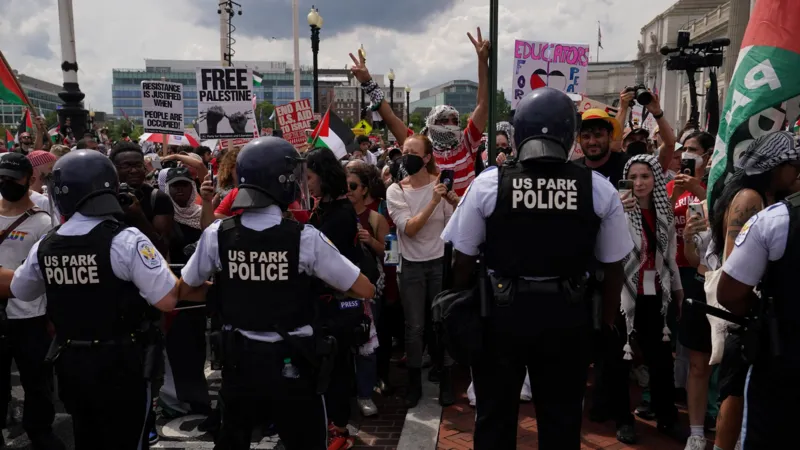Israel’s Prime Minister, Benjamin Netanyahu, delivered a significant speech to US lawmakers, emphasizing the shared threats faced by both nations. In his address, he stated, “our enemies are your enemies,” underscoring the common adversaries that Israel and the United States confront. This landmark speech to Congress was intended to garner support for Israel’s ongoing war against Hamas in Gaza. Despite Netanyahu’s efforts to rally support, the event was marked by noticeable pro-Palestinian protests both inside and outside the Capitol, highlighting the contentious nature of the conflict.
Netanyahu specifically highlighted Iran as a mutual threat. “When we fight Iran, we’re fighting the most radical and murderous enemy of the United States of America,” he declared, pointing to Iran’s actions and policies that both countries view as dangerous. He stressed the importance of unity in this struggle, stating, “Our fight is your fight, and our victory will be your victory.” This message was aimed at reinforcing the bond between Israel and the US, suggesting that their successes and challenges are intertwined.
The Israeli leader’s speech was met with a raucous reception from mostly Republican politicians, who showed strong support for his message. This enthusiastic response underscored the political divisions within the US regarding the Israel-Palestine conflict, with Republicans largely backing Netanyahu’s stance. This speech marked Netanyahu’s fourth address to a joint session of Congress, reflecting the long-standing and significant relationship between Israel and the United States.
Throughout his speech, Netanyahu sought to solidify support for Israel’s military actions and to frame the conflict in Gaza within the broader context of global security and shared values. By doing so, he aimed to strengthen the alliance between Israel and the US, emphasizing that the challenges they face are part of a larger struggle against radicalism and terrorism. The backdrop of pro-Palestinian protests, however, served as a reminder of the complex and divisive nature of this ongoing conflict.
Nancy Pelosi, a Democrat and former Speaker of the US House of Representatives, criticized Benjamin Netanyahu’s speech in Congress in a post on X. She called it the worst presentation by any foreign dignitary invited to address Congress. Pelosi did not attend the speech, choosing instead to meet with Israelis affected by the Hamas attack on October 7, as stated by her office. She expressed her hope that the prime minister would work towards a ceasefire deal to bring the hostages home.
The political divisions over the war in Gaza were evident with many Democratic members of Congress not attending and thousands of protesters outside. Protesters on Capitol Hill held banners, one calling Netanyahu a “wanted war criminal,” referring to an arrest warrant sought by the International Criminal Court’s prosecutor. Police arrested five people inside the Capitol for trying to disrupt Netanyahu’s address.
Netanyahu responded to the protesters, calling them “Iran’s useful idiots.” He spoke to Congress about an “axis of terror” involving Iran that threatened the US, Israel, and the Arab world, calling it a “clash of barbarism against civilisations.” He referred to Iran’s “axis of resistance,” an alliance including Hamas, Hezbollah, and the Houthis. Netanyahu claimed Iranian proxy forces had attacked American targets and said that Iran believes it must first conquer the Middle East to challenge America. He concluded by stating that Israel, a pro-American democracy, stands in Iran’s way in the Middle East.

Mr. Netanyahu spoke for over an hour, defending Israel and describing the war in Gaza as a fight for Israel’s survival. He asked for more US military aid, thanking the US for its support over the years and saying Israel has given valuable intelligence in return.
He wants faster US military aid to help end the war in Gaza and prevent a bigger regional conflict. Quoting Winston Churchill, he said: “Give us the tools and we’ll finish the job.”
He didn’t talk much about the humanitarian crisis in Gaza, except to say Israel provides enough food, and if people aren’t getting it, it’s because “Hamas steals it.”
He envisions Gaza as a demilitarized and deradicalized area under Israeli control, run by Palestinians who don’t want to destroy Israel. He did not mention a two-state solution, which President Biden and Vice-President Harris support.
Many lawmakers did not attend.
Even though there were many standing ovations, it was clear that at least 39 lawmakers were absent from the speech. Most of these lawmakers were Democrats, including former Speaker of the House Nancy Pelosi, who said it was “inappropriate” for Mr. Netanyahu to visit. Vice President Kamala Harris was also not there due to a scheduling conflict.
During the speech, Michigan Democrat Rashida Tlaib, the first Palestinian-American member of Congress, held up a sign that said “guilty of genocide” and “war criminal.”
Benjamin Netanyahu, aware that Donald Trump might return to the White House, thanked the former president for moving the American embassy to Jerusalem and for recognizing Israeli control over the Golan Heights, which Israel took from Syria in 1967. Netanyahu and Trump are set to meet in Florida later this week.
In Israel, families of hostages still held in Gaza protested the speech in Tel Aviv’s Hostages Square. As the speech played on a screen with the sound muted and Hebrew subtitles, the crowd listened to the national anthem and then left while Netanyahu continued speaking.
Published: 25th July 2024
Also Read:
10 Women Behind Middle Eastern Beauty Brands
A Treasure Trove Of Beaches, Heritage And Adventure
The World’s Most Beautiful Islands Offer a True Escape to Paradise

